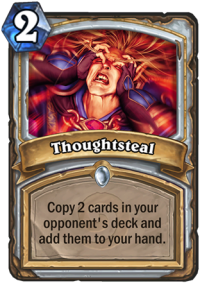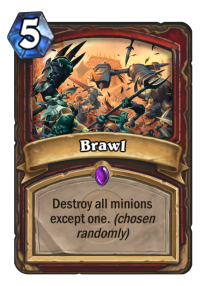Mindrender Illucia Probably one of the most difficult cards to use in Hearthstone history. Illucia is very powerful if played at the right time, but it can also “hit you in the back” if you don’t know how to use it. The number of cases where the player loses the game because the opponent takes advantage of Illucia more than the owner happens quite often.
It’s difficult to pinpoint in each specific case when Illucia should be used, so this article will guide you through the most common uses. One of the most important skills when using Illucia is having knowledge of the current meta. You need to know your opponent’s win rate and what cards they might be holding, etc. Only then can you apply one of the general “situations” below to perfect your Illicia use. mine.
Scenario 1 – You have cards your opponent has no use for
Sometimes you just want to use Illucia according to the mana curve. It’s also not necessarily “sticking to the curve”, it could be Turn 4, Turn 5. As long as your hand is full of late game cards or currently useless cards, Illucia can do well.

To successfully switch hands in this situation, you need to make sure your opponent can’t use any cards from your hand. For example, if it’s Turn 4 then you don’t want your opponent to be able to use the Turn 5 card. You can have a small minion for him to “steal”, or a removal card that is useless then (like Shadow Word: Death), cards that add value to the hand (like Thoughtstealer – if your opponent uses this card, it is mostly fine because they also add value to your hand – unless they get 2 immediately usable cards). And of course, expensive cards cannot be used by the opponent.
But why would we want to use Illucia this way? The answer is quite simple: you force your opponent to skip a turn and miss a draw (because they will draw cards from your deck). Often when facing decks, you are also the side that wants the game to slow down. Alternatively, you can steal cheap cards from your opponent’s hand. With Rogue you can waste Secret Passage, Backstab, Shadowstep (one note: if you Illucia twice on the same turn, you get your hand back and then your opponent changes hands twice, meaning your opponent can’t use your cards at all) . When meeting Aggro, you can throw 1 or 2 mana minions, or maybe cheap removal and burn cards. Basically you should use whatever you can. It doesn’t matter, because that’s not your main goal in Scenario 1.
Scenario 2 – Discard certain cards
This is probably the best use of Illucia, but it is also the most difficult to promote because it requires the player to properly time it. If used too early, your opponent’s hand may not have the card you want to discard. If used too late, the opponent probably already used them. There is no exact answer to guide you when to use Illucia, because it depends on who the opponent is, how many cards they have drawn, etc. Scenario 2 requires your meta knowledge: after the first few cards, you should be able to guess the opponent’s archetype as well as what their win condition and other information is.
 Scenario 2 is most effective against Combo decks. You want to play Illucia to waste one of your opponent’s key combo cards. The thing is, we don’t really have too many meta decks in the current meta. The most popular before the nerf was Illusion / Turtle Mage, but in this case, Tortollan Pilgrim is the only card your opponent really needs to get a win condition and you can’t use it because it’s too expensive. A better example is probably Malygos Druid. When you encounter this deck, there are many cards you can discard. The most beautiful you can toss Forest Warden Omu and a cheap spell to refill mana and hopefully destroy more cards. Best case, you rob Malygos and break his win condition, otherwise break Germination that’s OK. If your opponent’s hand doesn’t have those cards, you can temporarily deal with 0 mana Moonfire, limit the enemy’s ability to burst damage. Not to mention, Druid also has leaves Swipe so you can judge.
Scenario 2 is most effective against Combo decks. You want to play Illucia to waste one of your opponent’s key combo cards. The thing is, we don’t really have too many meta decks in the current meta. The most popular before the nerf was Illusion / Turtle Mage, but in this case, Tortollan Pilgrim is the only card your opponent really needs to get a win condition and you can’t use it because it’s too expensive. A better example is probably Malygos Druid. When you encounter this deck, there are many cards you can discard. The most beautiful you can toss Forest Warden Omu and a cheap spell to refill mana and hopefully destroy more cards. Best case, you rob Malygos and break his win condition, otherwise break Germination that’s OK. If your opponent’s hand doesn’t have those cards, you can temporarily deal with 0 mana Moonfire, limit the enemy’s ability to burst damage. Not to mention, Druid also has leaves Swipe so you can judge.
In addition, non-Combo decks are sometimes afraid of Illucia. Nearly every deck has a few important cards that don’t want to be discarded. It may be Sorter’s Apprentice by Tempo Mage, Wrenchcalibur / Upgrade! by Bomb Warrior, Zephrys the Great in Highlander decks (or even slimmer, you can throw Illucia after your opponent uses Dragonqueen Alexstrasza to get 1 mana Dragons), Aggro’s burn cards, etc…
If you don’t know what your opponent’s archetype is, it’s safest to play Illucia after their high-draw turn or when your opponent has a lot of cards in the hand. Chances are their hand will have something useful. In general, when you are familiar with the decks you often encounter, you will somewhat know when your opponent draws important cards to deal with them.
Scenario 3 – Value Creation Tool
Ideally, of course, you want to steal certain cards to make it easier for yourself or to make it more difficult for your opponent. But that doesn’t always happen. Maybe you drew Illucia too late and your opponent has already used important cards. Maybe he doesn’t have any important cards worth stealing or you missed the chance. Either way, Illucia isn’t useless yet, as the player can use this card as a value generator.
However, you need to be prepared for everything before you can use Illucia. For example, you can play fast tempo for several turns in a row to draw your opponent’s health, as well as continuously reduce the amount of cards in your hand. When there’s nothing left for your opponent to steal, you can toss Illucia and spend the remaining 7 mana on cards from your opponent’s hand. Your opponent won’t steal anything because there’s nothing to steal (excluding the next card drawn, the topdeck). Meanwhile, you can steal some important cards from your opponent’s hand. Since having played tempo a few turns before, chances are high that your opponent won’t get a removal card from your hand but just passive cards for you to use the next turn.
Scenario 4 – Obstructing the opponent
Sometimes, you may want to discard a certain card from your opponent’s hand, but sometimes you don’t want them to be used… by swapping hands. In this situation, Illucia is not used to steal anything from the opponent’s hand. If you can rob it, that’s fine, because that’s not the main goal in situation 4. The goal here is not to let your opponent use anything in their hand.
 The best example would be getting a lot of minions on the table (like two strong Dragons from Dragonqueen) and launching Illucia when you don’t have any removal cards in your hand. This will prevent your opponent from clearing your table. Maybe the opponent the player meets is a Warrior and he intends to use Brawl on the next turn. But that can’t happen, because the hand you give him doesn’t have a clearing card. So, unless his top deck is really your removal from the deck, the opponent has no way to remove the minions on the table and he will probably die in the next turn.
The best example would be getting a lot of minions on the table (like two strong Dragons from Dragonqueen) and launching Illucia when you don’t have any removal cards in your hand. This will prevent your opponent from clearing your table. Maybe the opponent the player meets is a Warrior and he intends to use Brawl on the next turn. But that can’t happen, because the hand you give him doesn’t have a clearing card. So, unless his top deck is really your removal from the deck, the opponent has no way to remove the minions on the table and he will probably die in the next turn.
Another interesting case is to prevent lethal opponents. If you meet Aggro, while you have very little health left, for example. With the ability to be lethal, you can change hands to hinder the opponent, as well as find a way to heal from his hand.
When should you NOT use Illucia?
The question “when to take Illucia” is perhaps the most common, but the question “When not to use Illucia” no less important. There are absolute situations where you do NOT want to use Illucia. Even if you feel it’s the right time to steal your opponent’s cards, you need to consider both your hand and what’s on the table, etc., and then consider whether to throw Illucia or not.
The most common mistake is giving your opponent one of your most valuable cards. For example, if you are holding Zephrys the Great in the Highlander deck, launching Illucia is really silly. Your opponent will use Zephrys and most likely have more profit than you. He can clear the table, throw dangerous minions or something like that. More importantly, your opponent will steal Zephrys from you. In long matches, you also don’t want to give your opponent a gift Galakrond, the Unspeakable. Giving him that card means the game will be much longer.
Another example is not using Illucia while you are holding a clearing card that can “smash your back” if it lands in your opponent’s hand. For example, when there is Soul Mirror on my hand and on my table are full of powerful minions that can be targeted by Soul Mirror… it’s best not to change hands. If you change the hannd, your opponent will use it, removing the strong card (Soul Mirrr) you have in your hand ALSO dealing with your table.
Although it rarely happens because it is quite obvious, but do not change hands when it can create a lethal ability for the opponent. Even though there aren’t any cards that directly burn damage, beware of the cards Shadow Madness, Apotheosis or any buff card: Inner Fire or Power Word: Feast. If he has Taunt, the removal / silence card also gives him a chance to be lethal. Therefore, players need to consider carefully before changing hands, especially when you are facing Aggro or are low on health.
Simply put, don’t use Illucia when “it does more harm than good”. Of course, if you encounter a Combo deck and think they have an important combo card in their hand, you can decide the outcome of the game by stealing them. In this case, the examples given above (except for situations where lethal opponents are allowed) are not worth considering whether to use Illucia or not. But unless Illucia can create A LOT of value or give you a clear win, then try to avoid using Illucia in “shouldn’t” situations.
Another thing to remember is that your opponent will get your current hand and a top deck when you use Illucia. Obviously, we have no way of avoiding the opponent to draw the top deck, but you also need to consider this situation. For example, if there are 5 cards left in the deck and one of them could be a Zephrys, it could inadvertently help your opponent win the game. Unless you REALLY have to, it’s better to wait a little longer to use Zephyrs and then switch hands.
EPILOGUE
As you can see, knowing when to use Illucia is not an easy task. If you are not an experienced Priest gamer, you will probably use Illucia at the wrong time many times. Usually it doesn’t make you lose the game right away, but in some situations, you give your opponent enough lethal tools that you don’t realize then. Illucia (emphasized many times above) also requires extremely good meta knowledge. To bring out the full potential of Illucia, you need to know what cards your opponent is holding in that moment. Of course, we can’t be 100% correct, but if you don’t know your opponent’s list of cards, you won’t know which cards you want to steal from your opponent and when is the right time.
The instructions above are just the basics. You can rely on the article to discover more and apply it in many different situations. But remember, each time you use Illucia, you will improve your skills more and more and may also upset your opponent when meeting Illucia.
According to hearthstonetopdecks
You can read related articles here:
Source link: Hearthstone: Guide to playing Mindrender Illucia, when is it beneficial to change hands?
– https://emergenceingames.com/



